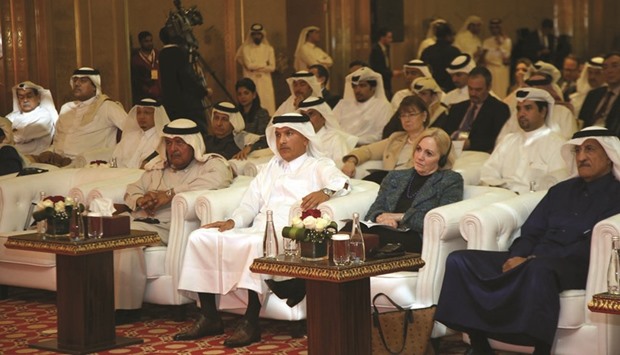Government representatives from Qatar and the US have concluded the ‘2nd Annual US-Qatar Economic and Investment Dialogue’ held in Doha.
The series of meetings was co-chaired by HE the Minister of Finance Ali Sherif al-Emadi together with the US Assistant Secretary of State for Economic and Business Affairs Charles Rivkin. The talks brought together key decision-makers to identify additional ways to bolster financial, economic, and investment relations, and build on the momentum generated by last year’s dialogue.
In a speech, al-Emadi stressed the strength of Qatar-US relations in different fields, including the oil and gas sector. He pointed to the outstanding cooperation in other areas such as higher education.
Al-Emadi voiced Qatar’s keenness on promoting cooperation with the US in different areas, including Information Technology, education, healthcare, financial services, and construction sectors.
He said the US is one of the biggest trade partners of Qatar, adding that in the first half of 2016, trade exchange between the two “increased significantly.” Qatar’s imports from the US reached $3.3bn, an 87% increase from the same period last year, the minister said.
Al-Emadi reviewed the achievements of Qatar during the last stage, specifically maintaining good economic growth rates in spite of falling oil and gas prices during the past two years, “thanks to the efforts of diversifying economic activities, efficient public spending, and promoting growth in non-oil sectors, which stood at 5.8% during the first half of 2016.” He said the outlook for Qatar’s growth, a predicted rate of 3.4% in 2017, is considered “the highest expected growth in the GCC region.”
The Minister stressed Qatar will continue its “ambitious programme” of comprehensive development, which will increase expenditure allocations for major projects in the general budget over the next three years to ensure implementation of projects in the framework of the approved plans and timetables.
These projects cover various key sectors, namely health, education, and transportation, in addition to infrastructure projects and projects related to hosting the 2022 FIFA World Cup.
He said Qatar “works to promote local and foreign investments in all economic areas” to support growth and to achieve sustainable development through a wide range of initiatives to develop the business environment, increase cooperation between the public and private sectors, and provide support for the private sector to promote participation in various economic sectors.
The dialogue also saw the participation of the US Chamber of Commerce, which led more than 30 business executives from 18 companies, including the leadership of the American Chamber of Commerce in Qatar.
“The US-Qatar Economic and Investment Dialogue is a testament to the strength of the bilateral relationship and the commitment of the business community to supporting trade and investment between our two countries,” said Khush Choksy, senior vice president for Middle East Affairs at the US Chamber.

HE al-Emadi and other dignitaries during the ‘2nd Annual US-Qatar Economic and Investment Dialogue’ held in Doha.
